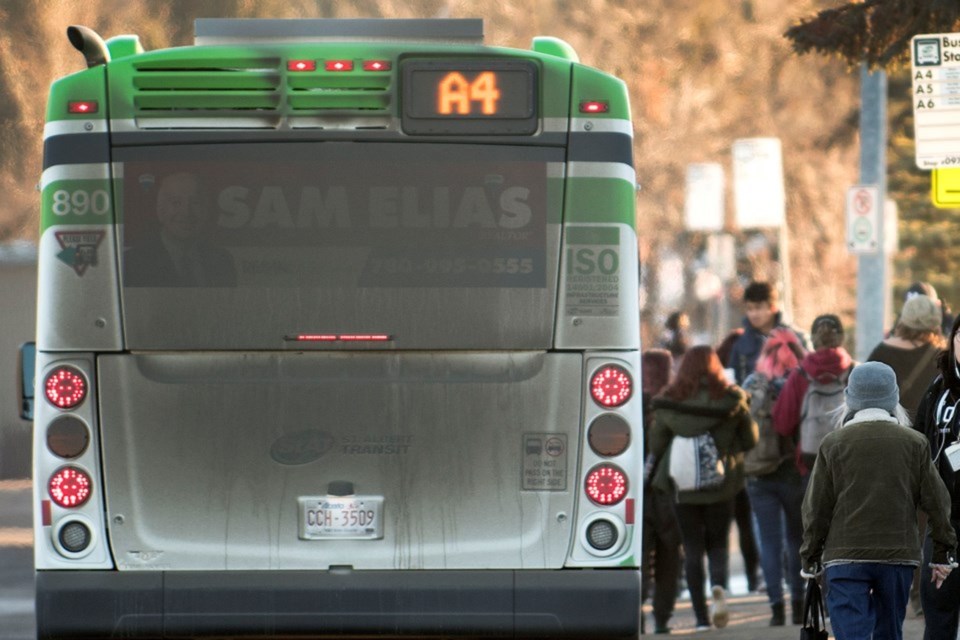St. Albert will need to spend an additional $963,000 in 2026 to purchase nine new transit buses to replace some of its existing fleet, bringing the total cost for that year to nearly $9.25 million.
The nearly $1 million increase is in line with a similar budget increase council approved last month to the city's three-year spending plan to expand the transit fleet by two and to replace 17 of the city's existing diesel buses, which have reached the end of, or superseded, their 18-year life expectancy.
READ MORE: New transit buses to cost $1.5 million more than expected: City
With council approving another budget increase on June 18, the city's three-year spending plan now involves $1.83 million this year to purchase the two new buses needed to introduce transit service in Jensen Lakes and Riverside; about $10.5 million in 2025 to purchase eight replacement buses; and $9.23 million to purchase nine replacement buses in 2026.
A report to council written by city fleet manager Tom Kumka says that 2026 increase of $963,000 is a result of negotiations between the city and Canadian bus manufacturer Nova Bus Inc., the company supplying St. Albert with the new buses.
Uncertain future of diesel engine buses
Kumka also noted in his report that Nova Bus Inc. plans to stop producing diesel engine transit buses in 2026.
The company's decision won't affect the city's order for nine new buses to be delivered on or shortly after Jan. 1, 2026, and Kumka said in an email the city's contract with Nova Bus Inc. includes a clause that requires the company to ensure replacement parts and “special tools” for the buses will be available for the next 15 years.
With Nova Bus Inc.'s decision to get out of the diesel engine bus market, Kumka wrote that “minimal competition” in the industry may mean the city will see “future price volatility” if the plan is to have diesel engine buses continue to make up the majority of the transit fleet.
Coun. Wes Brodhead, who represents St. Albert on the board of directors of the Canadian Urban Transit Association, said Nova Bus Inc.'s decision to stop producing diesel buses means the city will need to decide — or wait and see what higher levels of government or the market decides — what direction to take with its transit fleet.
“The whole industry is going to zero emission,” Brodhead said. “Whatever that product looks like, whether it's battery electric bus or whether it's hydrogen, it's in St. Albert's best interest to keep their finger on the pulse of that and watch what's happening, and then start to plan appropriately.”
“Whether we do it voluntarily or we get told to do it, we're going to be dealing with zero-emission vehicles here sooner or later.”
Coun. Sheena Hughes said St. Albert is now facing a “serious predicament”, especially because the city's seven electric buses that have been in operation since 2017 and 2018 haven't lived up to expectations.
RELATED: St. Albert's electric buses not lasting as long as expected
“The reality with the electric buses to date have been over-promised and under-delivered for life expectancy, battery, all of it,” Hughes said. “We are now being forced to look into continuing to purchase a product which has not delivered as well as diesel buses, which will increase our costs.”
“I think that we should stay with diesel for as long as we can, because we, at this point, and the taxpayers, will be paying a lot more for buses.”
Hughes also said she doesn't think council should decide now whether to fully transition to an electric bus fleet, for example, or risk price volatility with New Flyer being the sole Canadian manufacturer of diesel engine buses.
“We have to continue to see how these cards roll out before we decide which way to go,” she said. “I don't want to be making knee-jerk reactions.”
According to Kumka's report, the city will likely need to replace an additional 20 or so buses before 2030 as 14 buses in the 62-bus fleet are 15 years old, and at least six buses not being replaced under the three-year spending plan are currently 17 years old. As well, Kumka told the Gazette just 25 buses in the city's fleet are less than 12 years old.
Coun. Mike Killick told the Gazette if the city fully transitions to an electric fleet soon he expects it to have a better experience, as technology has advanced in the six or seven years since St. Albert purchased its first electric buses.
“There will be a whole new version of technology and battery technology coming up,” he said. “It's something we're going to have to keep a very, very close watch on.”
Killick also said he hopes there will continue to be provincial and federal grants for municipalities in the future, the way St. Albert received $2.1 million in funding from both levels of government combined to purchase the city's first electric buses, which cost almost $1 million each.
Nova Bus Inc. did not respond to the Gazette's request for comment about the company's decision to stop producing diesel-powered buses.




